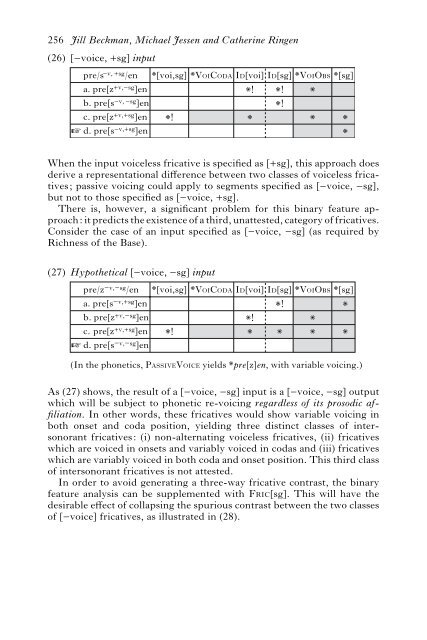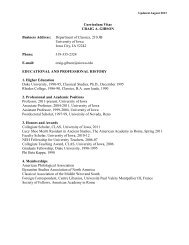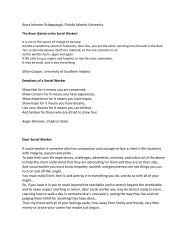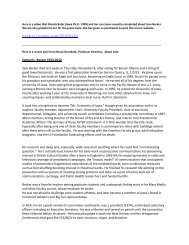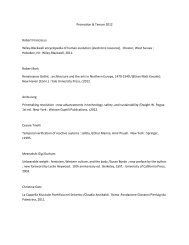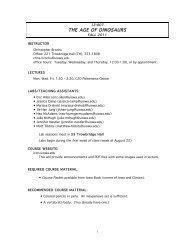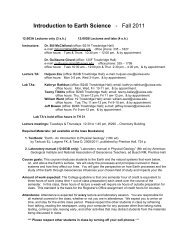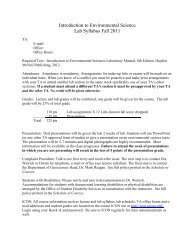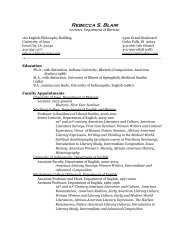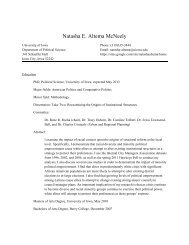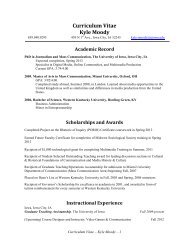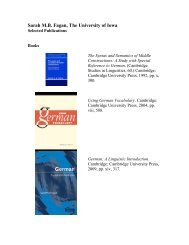German fricatives: coda devoicing or positional faithfulness?
German fricatives: coda devoicing or positional faithfulness?
German fricatives: coda devoicing or positional faithfulness?
You also want an ePaper? Increase the reach of your titles
YUMPU automatically turns print PDFs into web optimized ePapers that Google loves.
256 Jill Beckman, Michael Jessen and Catherine Ringen<br />
(26)<br />
[—voice, +sg] input<br />
pre/s—v, +sg/en *[voi,sg] *VoiCoda Id[voi]<br />
a. pre[z+v,—sg]en<br />
*!<br />
b. pre[s—v, —sg]en<br />
c. pre[z+v,+sg]en<br />
d. pre[s—v,+sg]en<br />
*!<br />
*<br />
Id[sg]<br />
*!<br />
*!<br />
*VoiObs<br />
*<br />
*<br />
*[sg]<br />
*<br />
*<br />
When the input voiceless fricative is specified as [+sg], this approach does<br />
derive a representational difference between two classes of voiceless <strong>fricatives</strong>;<br />
passive voicing could apply to segments specified as [lvoice, lsg],<br />
but not to those specified as [lvoice, +sg].<br />
There is, however, a significant problem f<strong>or</strong> this binary feature approach:<br />
it predicts the existence of a third, unattested, categ<strong>or</strong>y of <strong>fricatives</strong>.<br />
Consider the case of an input specified as [lvoice, lsg] (as required by<br />
Richness of the Base).<br />
(27)<br />
Hypothetical [—voice, —sg] input<br />
pre/z—v,—sg/en<br />
a. pre[s—v,+sg]en<br />
b. pre[z+v,—sg]en<br />
c. pre[z+v,+sg]en<br />
d. pre[s—v,—sg]en<br />
*[voi,sg] *VoiCoda Id[voi]<br />
*!<br />
*!<br />
*<br />
Id[sg]<br />
*!<br />
*<br />
*VoiObs<br />
*<br />
*<br />
*[sg]<br />
*<br />
*<br />
(In the phonetics, PassiveVoice yields *pre[z]en, with variable voicing.)<br />
As (27) shows, the result of a [lvoice, lsg] input is a [lvoice, lsg] output<br />
which will be subject to phonetic re-voicing regardless of its prosodic affiliation.<br />
In other w<strong>or</strong>ds, these <strong>fricatives</strong> would show variable voicing in<br />
both onset and <strong>coda</strong> position, yielding three distinct classes of interson<strong>or</strong>ant<br />
<strong>fricatives</strong>: (i) non-alternating voiceless <strong>fricatives</strong>, (ii) <strong>fricatives</strong><br />
which are voiced in onsets and variably voiced in <strong>coda</strong>s and (iii) <strong>fricatives</strong><br />
which are variably voiced in both <strong>coda</strong> and onset position. This third class<br />
of interson<strong>or</strong>ant <strong>fricatives</strong> is not attested.<br />
In <strong>or</strong>der to avoid generating a three-way fricative contrast, the binary<br />
feature analysis can be supplemented with FRIC[sg]. This will have the<br />
desirable effect of collapsing the spurious contrast between the two classes<br />
of [lvoice] <strong>fricatives</strong>, as illustrated in (28).


